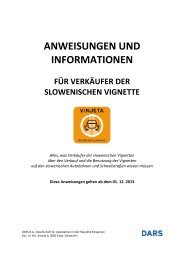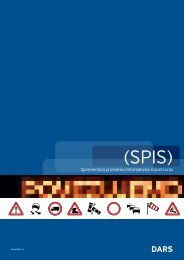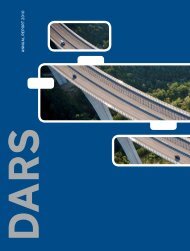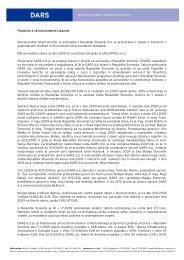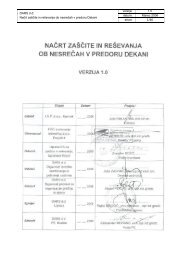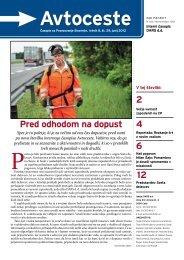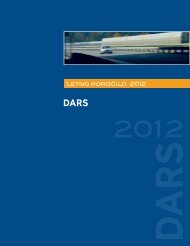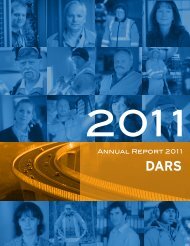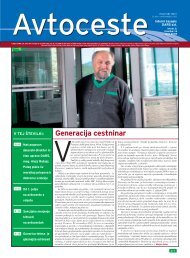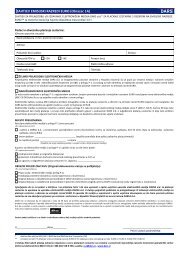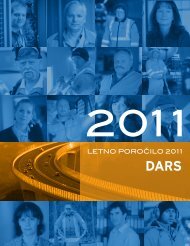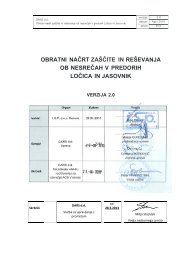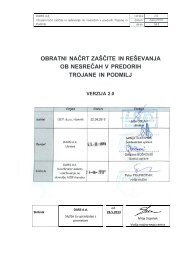DARS_porocilo 2007 ANG.indd
DARS_porocilo 2007 ANG.indd
DARS_porocilo 2007 ANG.indd
- No tags were found...
Create successful ePaper yourself
Turn your PDF publications into a flip-book with our unique Google optimized e-Paper software.
Provisions and long-term accrued costs and deferred revenue<br />
Provisions are formed by an entity for its present obligations that arise from obligating past events and<br />
are expected to be settled in a period that cannot be defined with certainty, but a reliable estimate can be<br />
made of the amount of obligations. Long-term provisions are set up for accrued costs or expenses and are<br />
decreased by the amounts of costs or expenses for which they were formed in accordance with the plan.<br />
Long-term accrued costs and deferred revenue comprise deferred revenue expected to cover estimated<br />
expenses in a period of more than one year.<br />
In accordance with SAS 2006, the Company set up long-term provisions for termination benefits upon<br />
retirement and jubilee benefits based on actuarial calculations. These were made as at 31 December<br />
<strong>2007</strong> for each and every employee, taking into account the costs of termination benefits upon retirement<br />
under their employment contracts, as well as the costs of all jubilee benefits that an employee would<br />
receive for his/her period of service until retirement.<br />
In 2006, the Company joined a pension scheme for collective supplementary pension insurance. In<br />
accordance with an agreement concluded with trade unions, all the Company’s employees were entitled<br />
to join this scheme, except those being of retirement age on 31 December 2006, i.e. 50 years (women)<br />
and 55 years (men). The employer shall pay to these employees a lump sum equal to the interest-free<br />
premiums it would have to pay on their behalf had they been included in the pension scheme. For this<br />
purpose, the Company also set up long-term provisions.<br />
Long-term provisions for long-term accrued costs are also set up with regard to the possible unfavourable<br />
outcome of lawsuits related to motorway operation and maintenance, as well as labour lawsuits.<br />
In 2005, 2006 and <strong>2007</strong>, the Company set up long-term provisions for long-term accrued costs related to<br />
employment relationships that will arise upon the introduction of the new satellite toll system. Such a toll<br />
system, under which motorway users pay a toll based on the number of kilometres driven, is — pursuant<br />
to a decision adopted by the Government at its 51st session of 22 November 2001 — the ultimate vision<br />
and objective of the Slovene motorway system. The deadline for the implementation of the new satellite<br />
toll system is August 2009 for freight traffic and December 2010 for other vehicles.<br />
The Company has assessed that, as a consequence of the changed toll system, some 300 employees<br />
will become redundant. Based on the Company’s current needs, some of them will be retrained for other<br />
professions, primarily in the area of road supervision. Sixteen employees will have the possibility of<br />
purchasing additional years of service. The Company has thus accrued one quarter of such costs in the<br />
<strong>2007</strong> costs and has accordingly set up long-term provisions.<br />
The Company has assessed that an estimated 100 employees will receive severance pay. One quarter of<br />
such costs has therefore been accrued for this purpose in the <strong>2007</strong> costs, and long-term provisions have<br />
therefore been set up accordingly. The remaining quarter of estimated costs arising from employment<br />
relations will gradually be charged against the Company’s operating results in 2008.<br />
Long-term accrued costs and deferred revenue comprise long-term deferred revenue in the amount cofinanced<br />
by users of the ETC (electronic toll collection) system. This co-financing relates to long-term<br />
provisions for warranties granted on the sale of electronic tags since 2004. At the end of each accounting<br />
period, long-term accrued costs and deferred revenue are restated to the present value of expenses<br />
required to settle the liability. Up to 31 December 2003, long-term provisions were included in the balance<br />
sheet of state-owned assets and liabilities under management.<br />
The item of long-term accrued costs and deferred revenue includes long-term deferred revenue from<br />
earmarked grants received by the Company for the acquisition of assets. They are intended to cover<br />
depreciation expense of such assets and are used by being transferred to operating revenue.<br />
59 ANNUAL REPORT <strong>DARS</strong> d.d. <strong>2007</strong> FINANCIAL REPORT



